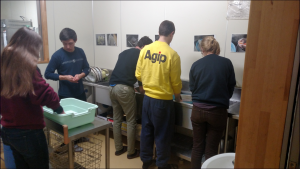Konbawa!
Since our arrival at ARI, I have been participating in what is called the “One Bowl Club” (OBC). It means that for each meal the only kitchenware we use individually is a single bowl and a utensil of our choosing. The idea was created by Nate Mitka, a St. Olaf student in the 397 section. The original idea was to minimize the work for dishwashers. Since the job of dishwasher rotates day-to-day, this change will impact everyone at some point. While this is still a main component of the club, I believe it has transformed into something much greater and that it really encompasses a lot regarding this class.

A big reason I participated initially was to create a small sense of community or brotherhood between others that decided to participate. Since I was starting a month long course with people I, for the most part, did no know, I thought it would be a great way to get to know some of my classmates better. This bond is maintained and strengthened through mealtime discussions regarding how One Bowl Club has made an impact on us. This sense of community building is a big part of our time at ARI. Training at ARI is built on the idea that people learn through sharing. As the members of One Bowl Club share this experience and what sort of impacts it has, we will grow together and individually.
At one of the mealtime discussions, Trevor William Stewart suggested that participation in OBC increased spirituality. While it was meant as a joke at the time, after some reflection, I actually do believe that my membership has matched my spirituality, to some extent. I do not consider myself a super religious or spiritual person. However, I try to treat others the way I wish to be treated, be conscious of small details, and to appreciate everything. I believe that OBC really matches up well with this.
OBC considers the workload of others. I know that I would like to have fewer dishes to wash, so by deciding to only use one piece of dishware, I am reducing the workload of others. Even though only using one bowl is sometimes a minor inconvenience, I feel that it helps others enough to certainly make it worth it.
Also, OBC has made me more understand that small differences can lead to big impacts. Even though only using one bowl makes a small difference individually, I can see that the impact would be very large if everyone did it. This is especially prevalent in what we learn about global warming and sustainability. Many times people elect not live with a greener mindset because they feel that the impact is very small. This is often referred to as a drop in the bucket, meaning that people’s individual impact do not seem important in the context of everyone’s impact combined. However, if everyone reduced his or her negative impact on the environment on the individual level, the large-scale impact would certainly be large. It only takes people making small sacrifices to see a difference if everyone participates.
OBC has also made me more appreciative of what I have. Because I am limited in what I put in my bowl for each trip to the food line, I am more aware of what I am electing to eat. Much like cooking makes people more aware of what they are eating, being limited in what I can take each visit makes me make better food choices I feel. Also, I have noticed that my rate of eating has slowed quite a bit through OBC. This has made my eating experience much less rushed, and I am able to take in my surroundings more. One of our first journal prompts in Japan was, “What is good food?” While many people initially think of the food itself, our class discussed how a meal can be impacted by setting, company, and environment. Food will taste better when consume in pleasing areas with friendly people and engaging conversation. By participating in OBC, I am able to slow down my eating so that I can more actively take in my surroundings and engage in the conversation around me. This change allows the food to be better food by the way our class defined food earlier in the month. The slower pace also allows me more time to think about how this food was created, handled, and cooked. It makes me appreciative of the food I am able to have and that it should not be something to take for granted. For many, a single bowl of food is a huge luxury, not a given.
Also, from a purely environmental standpoint, I believe One Bowl Club makes a lot of sense. Because I only take a small amount of food at a time, I am much less likely to have any food waste. I think everyone has been guilty of having eyes bigger than his or her stomach. With a plate or multiple pieces of kitchenware, it is very easy to get away from yourself and take a lot more food than you can handle. With a bowl, you are able to gauge how hungry you are in between trips up to the food table. Furthermore, only using a bowl reduces the amount of dishes that need to be washed, so there is less water needed.
While I am focusing on the benefits of OBC, I should mention that there are some downsides that we have experienced during this month. Initially, only using one bowl made me feel more rushed to eat the food in front of me so that I could replenish my bowl before the available food in the dinning hall ran out. However, after some controlled restraint and the understanding that there will be plenty of food to go around, I was able to overcome this rush and reap more benefits from OBC. Also, when I do leave the table to grab food, I have to leave the conversation for a stretch of time. While this is unfortunate and currently unavoidable, I do think the positives outweigh this negative. Also, I feel it makes me more conscious of the conversation and aware of when it is more appropriate to step away from the conversation.
Overall, I am very pleased with how One Bowl Club has turned out. I have made tighter bonds with some of my classmates and have learned a lot about myself along the way. I am intrigued how I will carry this experience with me going forward when I return to the States and the St. Olaf caf. I encourage others to make small changes so that together we can make a big impact!

Eric Frank

Recent Comments